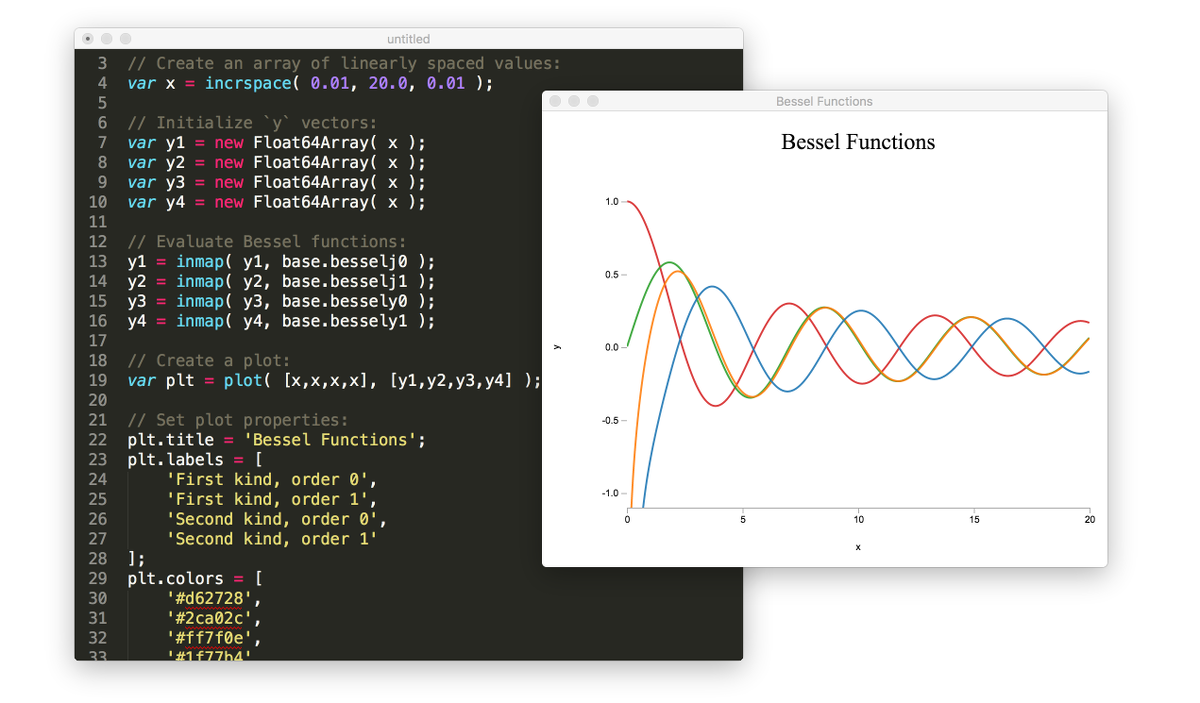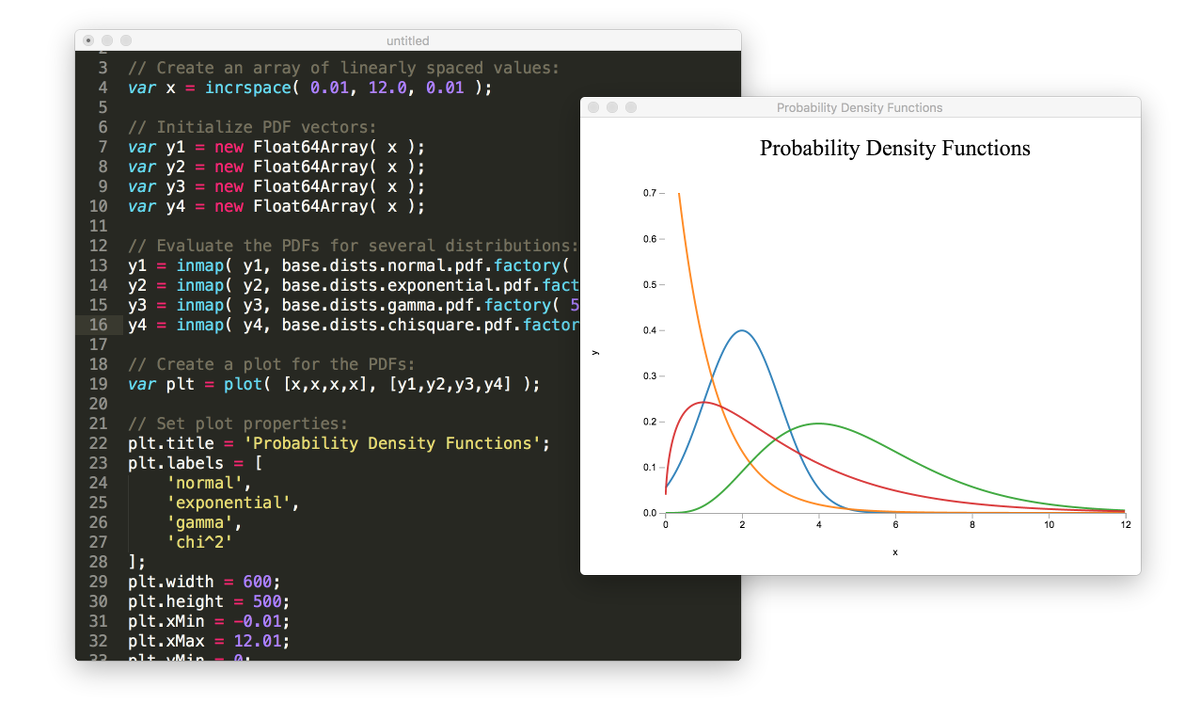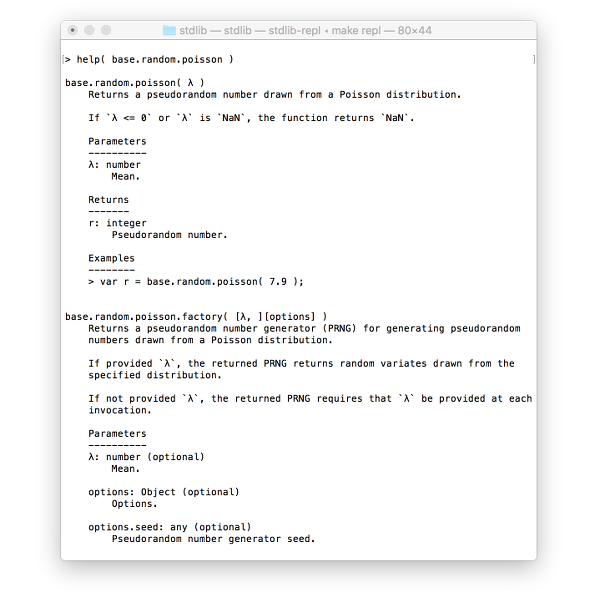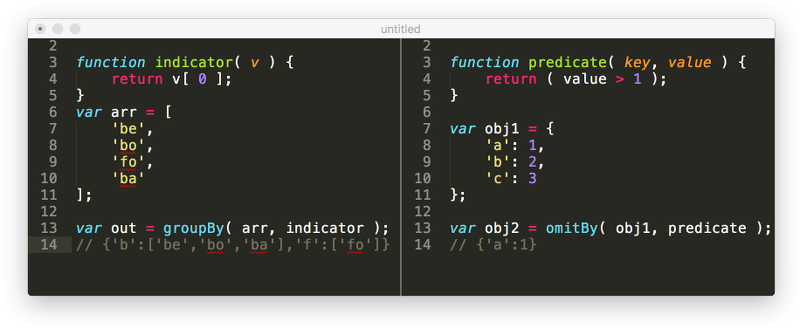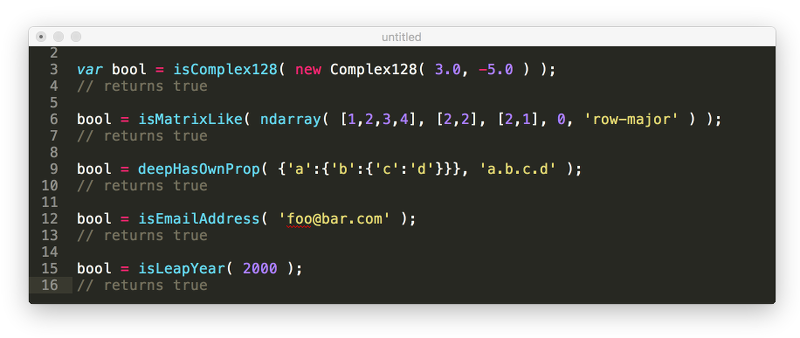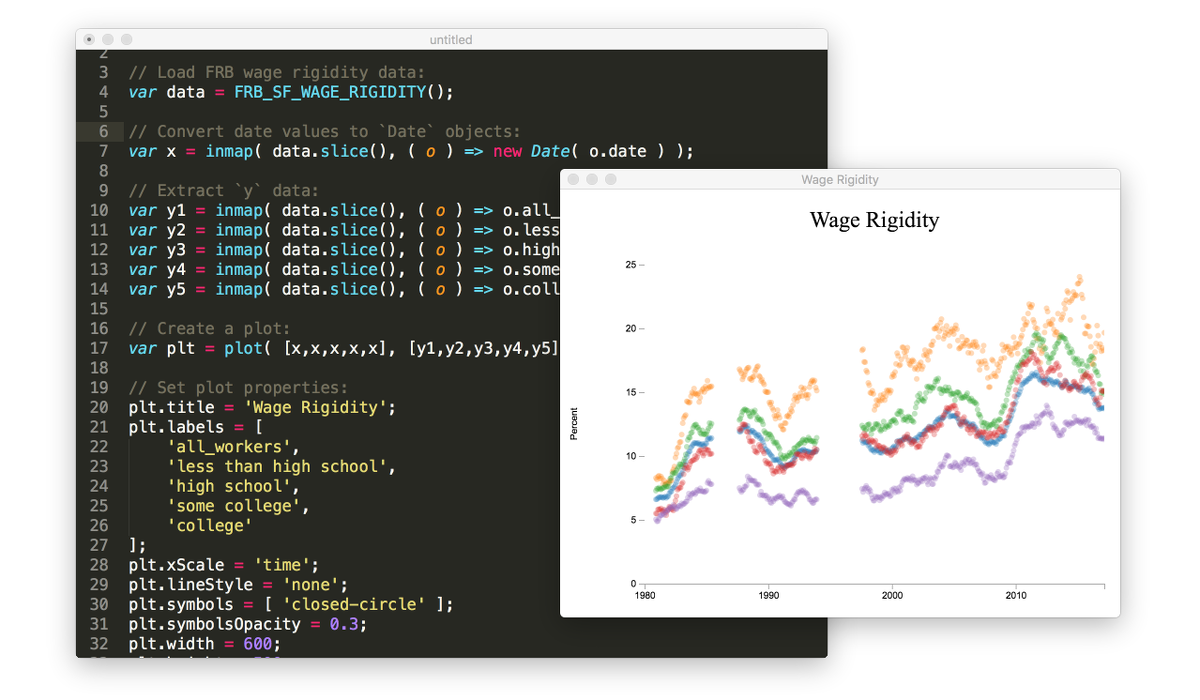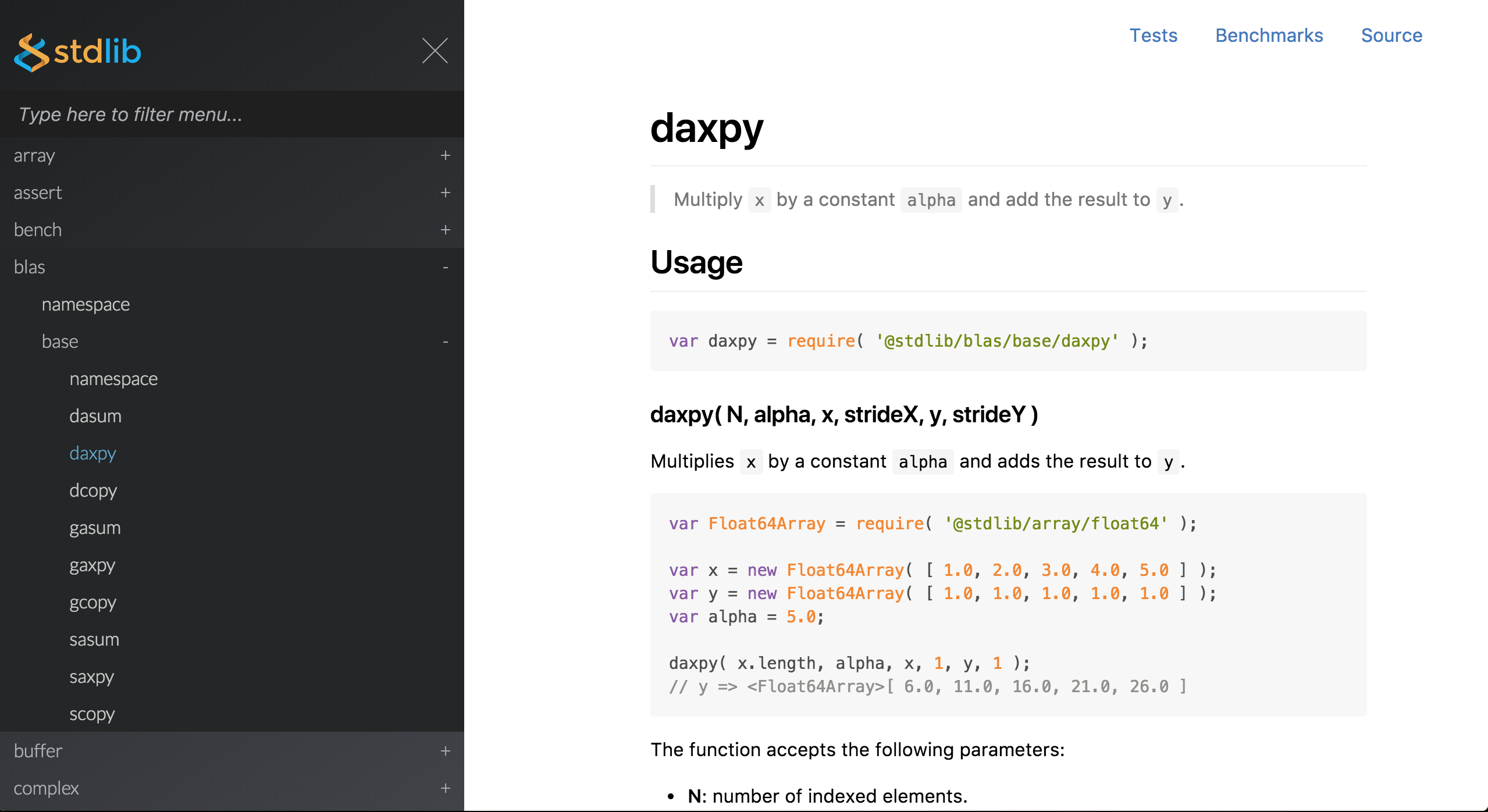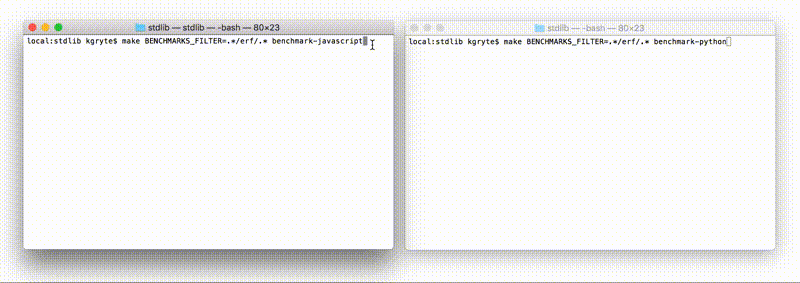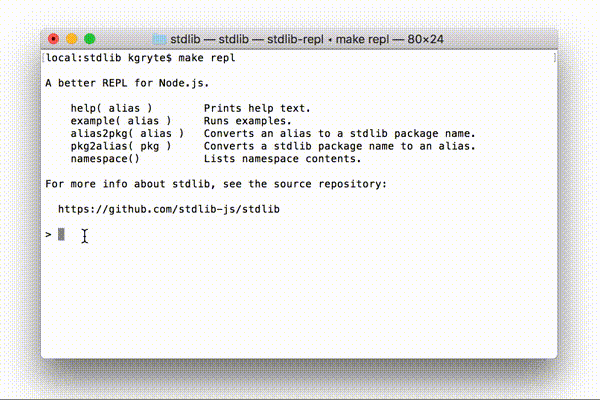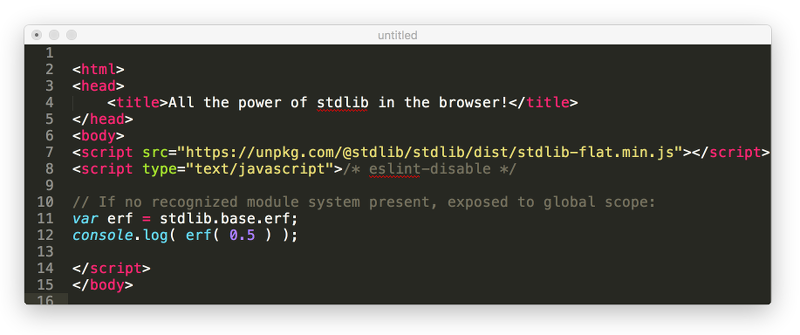stdlib (/ˈstændərd lɪb/ "standard lib") is a standard library for JavaScript and Node.js, with an emphasis on numerical and scientific computing applications. The library provides a collection of robust, high performance libraries for mathematics, statistics, data processing, streams, and more and includes many of the utilities you would expect from a standard library.
This is the GitHub repository of stdlib source code and documentation. For help developing stdlib, see the development guide.
Resources
External Resources
Features
-
150+ special math functions.
-
35+ probability distributions, with support for evaluating probability density functions (PDFs), cumulative distribution functions (CDFs), quantiles, moments, and more.
-
40+ seedable pseudorandom number generators (PRNGs).
-
200+ general utilities for data transformation, functional programming, and asynchronous control flow.
-
200+ assertion utilities for data validation and feature detection.
-
50+ sample datasets for testing and development.
-
A plot API for data visualization and exploratory data analysis.
-
Native add-ons for interfacing with BLAS libraries, with pure JavaScript fallbacks.
-
A benchmark framework supporting TAP.
-
REPL environment with integrated help and examples.
-
Can be bundled using Browserify, Webpack, and other bundlers for use in web browsers.
Installation
To accommodate various use cases, stdlib can be consumed in multiple ways. The preferred means of consumption depends on your individual use case. We've provided some user stories to help you identify the best approach.
While this project's installation instructions defaults to using npm for package management, installation via other package managers, such as yarn, should be a matter of simply swapping out npm commands with those of the relevant package manager.
User Stories
-
I want to perform data analysis and/or data science related tasks in JavaScript and Node.js, similar to how I might use IPython, Julia, R, and/or MATLAB.
- Install the entire project as a command-line utility.
-
I am building a web application.
-
I plan on using Browserify, Webpack, and other bundlers for use in web browsers.
- Install individual packages. Installing the entire project is likely unnecessary and will lead to slower installation times.
-
I would like to vendor a custom bundle containing various stdlib functionality.
- Follow the steps for creating custom bundles.
-
I would like to include stdlib functionality by just using a
scripttag.- Install one of the pre-built UMD browser bundles or consume one of the pre-built bundles via a CDN, such as unpkg.
-
I am interested in using a substantial amount of functionality found in a top-level stdlib namespace and don't want to separately install hundreds of individual packages (e.g., if building an on-line calculator application and wanting all of stdlib's math functionality).
-
Install one or more top-level namespaces. Installing the entire project is likely unnecessary and will lead to slower installation times. Installing a top-level namespace is likely to mean installing functionality which will never be used; however, installing a top-level namespace is likely to be easier and less time-consuming than installing many individual packages separately.
When bundling, installing a top-level namespace should not be a concern, as individual functionality can still be independently required/imported. Project installation times may, however, be somewhat slower.
-
-
-
I am building a Node.js server application.
-
I am interested in using various functionality found in stdlib.
- Install individual packages. Installing the entire project is likely unnecessary and will lead to slower installation times.
-
I am interested in using a substantial amount of functionality found in a top-level stdlib namespace and don't want to separately install hundreds of individual packages.
- Install one or more top-level namespaces. Installing the entire project is likely unnecessary and will lead to slower installation times. Installing a top-level namespace is likely to mean installing functionality which will never be used; however, installing a top-level namespace is likely to be easier and less time-consuming than installing many individual packages separately.
-
-
I am using Deno.
- Use skypack to import individual packages.
-
I would like to use stdlib functionality in an Observable notebook.
- Consume one of the pre-built browser bundles via a CDN, such as unpkg.
-
I want to hack at stdlib, possibly even creating customized builds to link to platform-specific native libraries (such as Intel's MKL or some other numerical library).
- Install the project as a system library by cloning this repository and following the installation instructions as described in the development guide.
Complete Library
To install the entire project as a library or application dependency,
$ npm install @stdlib/stdlibOnce installed, stdlib packages can be individually required/imported to minimize load times and decrease bundle sizes. For example, to use require
var ndarray = require( '@stdlib/ndarray/ctor' );
var arr = ndarray( [ [ 1, 2 ], [ 3, 4 ] ] );
// returns <ndarray>and to use import
import ndarray from '@stdlib/ndarray/ctor';
var arr = ndarray( [ [ 1, 2 ], [ 3, 4 ] ] );
// returns <ndarray>Individual Packages
stdlib is designed to allow decomposition of the main project into individual packages which can be independently consumed. Accordingly, users of the project can avoid installing all project functionality and only install the exact functionality they need.
To install individual packages, replace forward slashes / after @stdlib/ with hyphens -. For example,
$ npm install @stdlib/ndarray-ctorOnce installed, individual packages can be required/imported. For example, to use require
var ndarray = require( '@stdlib/ndarray-ctor' );
var arr = ndarray( [ [ 1, 2 ], [ 3, 4 ] ] );
// returns <ndarray>and to use import
import ndarray from '@stdlib/ndarray-ctor';
var arr = ndarray( [ [ 1, 2 ], [ 3, 4 ] ] );
// returns <ndarray>Namespaces
stdlib is comprised of various top-level namespaces (i.e., collections of related functionality united by common themes). For example, to install all math functionality found in the top-level math namespace,
$ npm install @stdlib/mathOnce installed, packages within a top-level namespace can be individually required/imported to minimize load times and decrease bundle sizes. For example, to use require
var sin = require( '@stdlib/math/base/special/sin' );
var v = sin( 3.14 );
// returns <number>and to use import
import sin from '@stdlib/math/base/special/sin';
var v = sin( 3.14 );
// returns <number>Note: installing nested namespaces found within top-level namespaces (e.g., math/base) is not supported. Consider installing individual packages or the relevant top-level namespace.
Command-line Utility
To install globally for use as a command-line utility and/or use the REPL,
$ npm install -g @stdlib/stdlibwhich will expose the stdlib command. For example, to see available sub-commands
$ stdlib helpand to run the REPL
$ stdlib replBrowser Bundles
For pre-built distributable UMD bundles for use in browser environments or as shared ("vendored") libraries in server environments, see the dist directory and associated guide.
As an example, to include a UMD bundle exposing lower-level special math functions in a webpage, we can first locally install the UMD bundle package using npm
$ npm install @stdlib/dist-math-base-special-flatand then include the following <script> tag in our HTML document
<script type="text/javascript" src="/path/to/@stdlib/dist-math-base-special-flat/build/bundle.min.js"></script>making sure to modify the script path based on the local installation directory.
If no recognized module system is present, one can access bundle contents in another <script> tag via the global scope.
<script type="text/javascript">
// If no recognized module system present, exposed to global scope:
var erf = stdlib_math_base_special_flat.erf;
console.log( erf( 0.5 ) );
</script>For more details and available bundles, see the dist directory and associated guide. The guide includes instructions for consuming via CDNs, such as unpkg.
Custom Bundles
To create a custom bundle based on project needs,
-
follow the download, configuration, and installation instructions as described in the development guide.
-
navigate to the local installation directory.
-
run the following command to print help documentation for providing a list of stdlib package names to bundle
$ NODE_PATH=./lib/node_modules node ./bin/cli bundle-pkg-list -- -h
-
modify and run the above command with the list of packages to bundle
$ NODE_PATH=./lib/node_modules node ./bin/cli bundle-pkg-list -- <pkg> <pkg> <pkg> ...
Upon generating a bundle, the bundle can be loaded via a <script> tag as described above for pre-built distributable UMD bundles.
System Library
To install as a system library (e.g., for the purposes of creating custom builds), follow the download, configuration, and installation instructions as described in the development guide.
Prerequisites
Installing and running stdlib for use in Node.js requires the following prerequisites:
- Node.js: JavaScript runtime (version
>= 0.10) - npm: package manager (version
> 2.7.0; if Node< 1.0.0, version> 2.7.0and< 4.0.0; if Node<= 10.x.x, version> 2.7.0and< 6.0.0)
Most functionality in stdlib is implemented in JavaScript and no further prerequisites are required to use stdlib (i.e., you can safely avoid installing any additional prerequisites); however, some implementations try to capture performance benefits by using native bindings and/or WebAssembly. While not required to run stdlib, as every stdlib implementation has a JavaScript fallback, the following dependencies are required for building native add-ons, including linking to BLAS and LAPACK libraries:
- GNU make: development utility and task runner
- GNU bash: an sh-compatible shell
- gcc & g++ or Clang: C/C++ compilation and linking (g++ version
>= 4.8; clang version>= 3.5, Xcode version>=8.3.1on OS X) - gfortran: Fortran compilation and linking (version
>= 4.8)
While not required to run stdlib, the following dependencies are required for automatically downloading external libraries:
The following external libraries can be automatically downloaded and compiled from source using make:
Contributing
First time contributor?
- See the contributing guidelines.
Already an expert?
-
Fork the repository.
-
Clone the forked repository
$ git clone --depth=1 https://github.com/<username>/stdlib.git
where
<username>is your GitHub username. -
Navigate to the
stdlibdirectory$ cd stdlib -
Install dependencies
$ make install-node-modules
-
Initialize your stdlib development environment
$ make init
License
See LICENSE.
Copyright
Copyright © 2016-2021. The Stdlib Authors.


